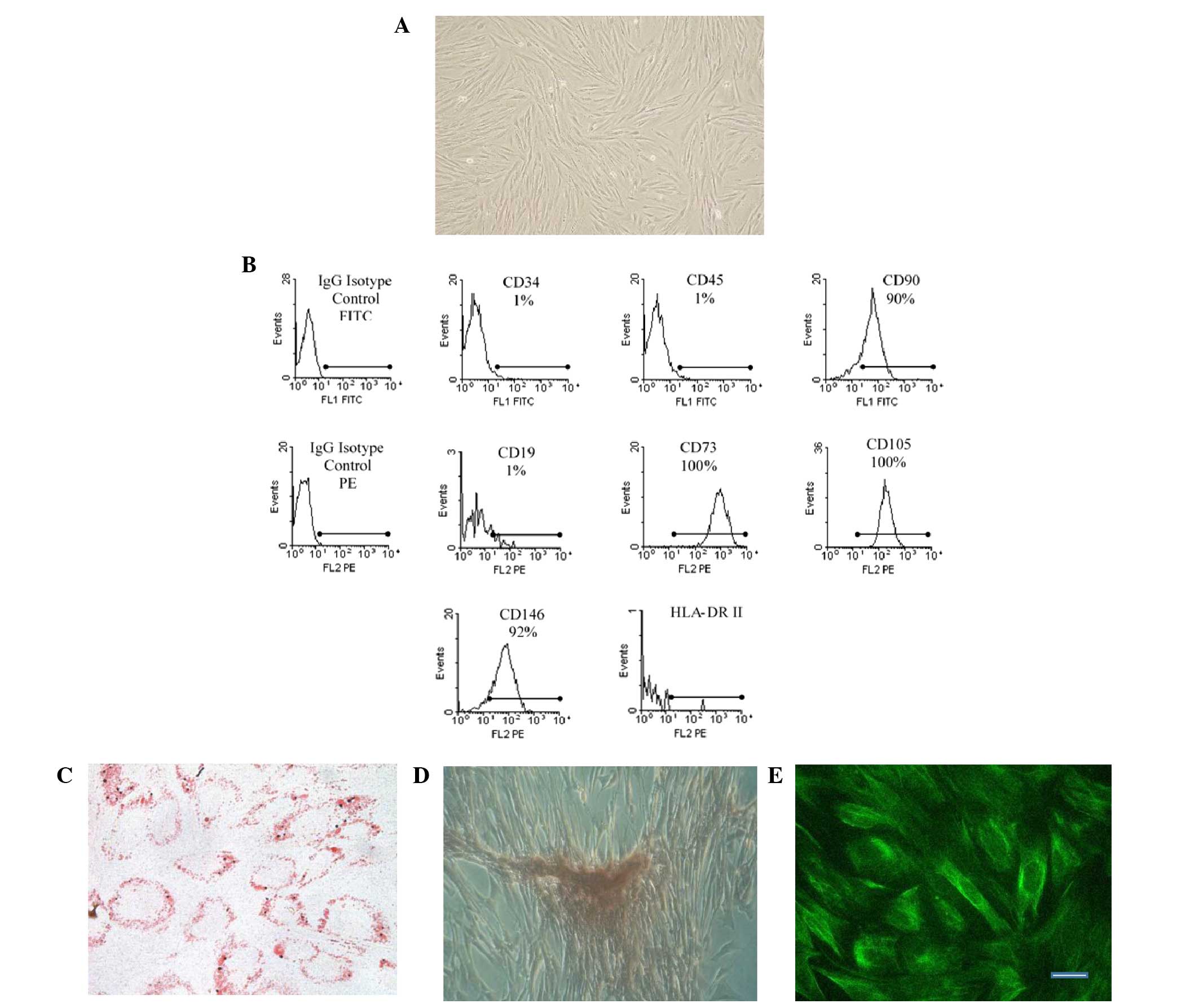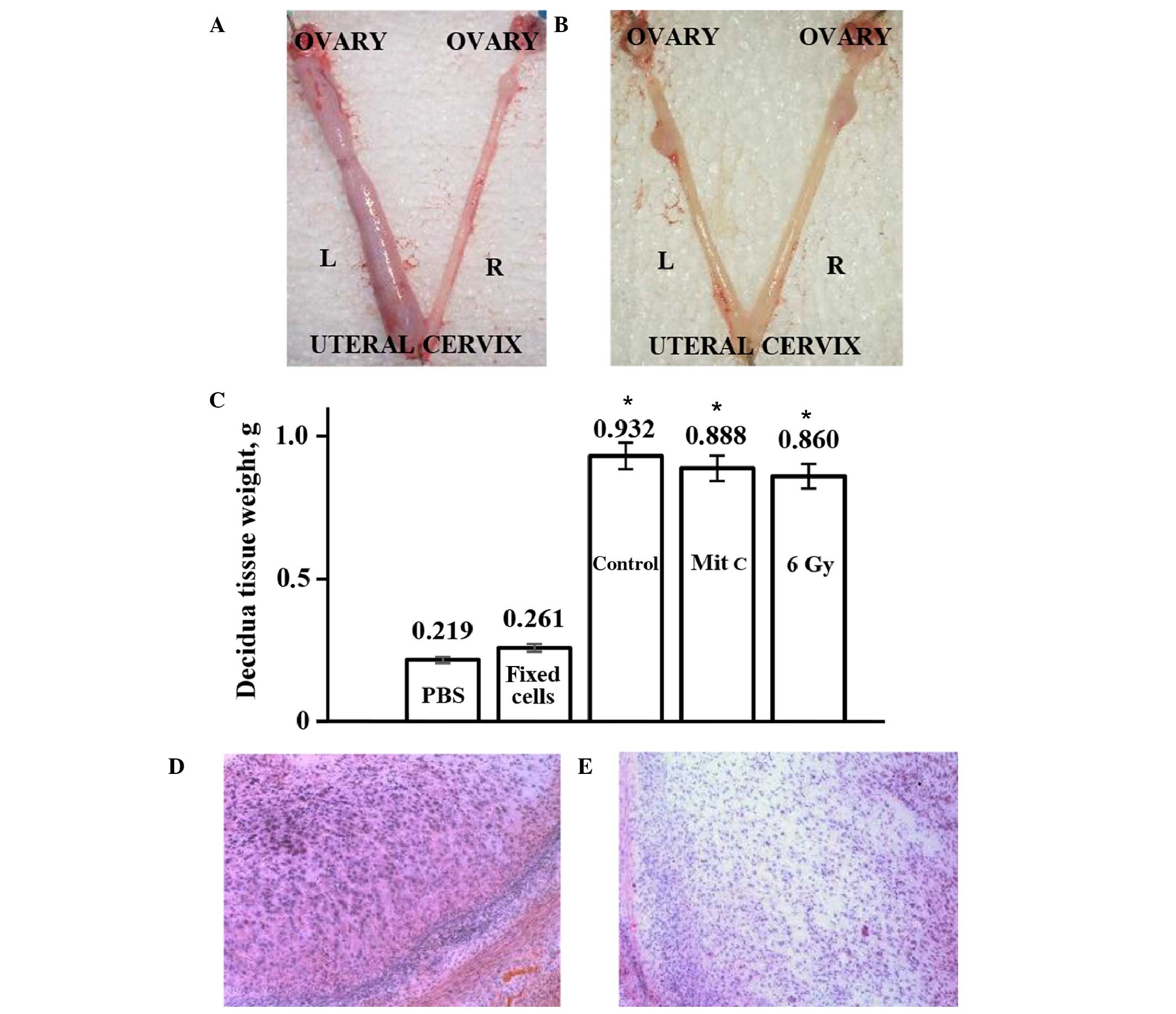|
1
|
Wang S, Qu X and Zhao RC: Clinical
applications of mesenchymal stem cells. J Hematol Oncol. 5:19–20.
2012. View Article : Google Scholar : PubMed/NCBI
|
|
2
|
Husein KS and Thiemermann C: Mesenchymal
stromal cells: current understanding and clinical status. Stem
Cells. 28:585–596. 2010.PubMed/NCBI
|
|
3
|
Parker AM and Katz AJ: Adipose derived
stem cells for the regeneration of damaged tissues. Expert Opin Bio
Ther. 6:567–578. 2006. View Article : Google Scholar
|
|
4
|
Harris DT, Badowski M, Ahmad N and Gaballa
MA: The potential of cord blood stem cells for use in regenerative
medicine. Exper Opin Biol Ther. 7:1311–1322. 2007. View Article : Google Scholar
|
|
5
|
Coppi P, De Bartsch G Jr, Siddiqui MM, Xu
T, Santos CC, Perin L, Mostoslavsky G, Serre AC, Snyder EY, Yoo JJ,
et al: Isolation of amniotic stem cell lines with potential for
therapy. Nat Biotechnol. 25:100–106. 2007. View Article : Google Scholar : PubMed/NCBI
|
|
6
|
Cho NH, Park YK, Kim YT, Yang H and Kim
SK: Lifetime expression of stem cell markers in the uterine
endometrium. Fertil Steril. 81:403–407. 2004. View Article : Google Scholar : PubMed/NCBI
|
|
7
|
Gargett CE: Identification and
characterization of human endometrial stem/progenitor cells. Aust
Nz J Obstet Gynaecol. 46:250–253. 2006. View Article : Google Scholar
|
|
8
|
Gargett CE and Masuda H: Adult stem cells
in the endometrium. Mol Hum Reprod. 16:818–834. 2010. View Article : Google Scholar : PubMed/NCBI
|
|
9
|
Meng X, Ichim TE, Zhong J, Rogers A, Yin
Z, Jackson J, Wang H, Ge W, Bogin V, Chan KW, et al: Endometrial
regenerative cells: A novel stem cell population. J Transl Med.
5:57–66. 2007. View Article : Google Scholar : PubMed/NCBI
|
|
10
|
Patel AN, Park E, Kuzman M, Benetti F,
Silva FJ and Allickson JG: Multipotent menstrual blood stromal stem
cells: isolation, characterization, and differentiation. Cell
Transplant. 17:303–311. 2008. View Article : Google Scholar : PubMed/NCBI
|
|
11
|
Dominina AP, Fridliandskaia II, Zemel'ko
VI, Pugovkina NA, Kovaleva ZV, Zenin VV, Grinchuk TM and Nikol'skiĭ
NN: Mesenchymal stem cells from human endometrium do not undergo
spontaneous transformation during long-term cultivation. Cell
tissue biol. 7:221–226. 2013. View Article : Google Scholar
|
|
12
|
Murphy MP, Wang H, Patel AN, Kambhampati
S, Angle N, Chan K, Marleau AM, Pyszniak A, Carrier E, Ichim TE and
Riordan NH: Allogeneic endometrial regenerative cells: An ‘off the
shelf solution’ for critical limb ischemia? J Transl Med. 6:452008.
View Article : Google Scholar : PubMed/NCBI
|
|
13
|
Mikhailov VM: Life cycle of decidual
cells. Int Rev Cytol. 227:1–63. 2003. View Article : Google Scholar : PubMed/NCBI
|
|
14
|
Kim JJ, Taylor HS, Lu Z, Ladhani O,
Hastings JM, Jackson KS, Wu Y, Guo SW and Fazleabas AT: Altered
expression of HOXA10 in endometriosis: Potential role in
decidualization. Mol Hum Reprod. 13:323–332. 2007. View Article : Google Scholar : PubMed/NCBI
|
|
15
|
Csemiczky G, Wramsby H, Johannisson E and
Landgren BM: Importance of endometrial quality in women with tubal
infertility during a natural menstrual cycle for the outcome of IVF
treatment. J Assist Reprod Genet. 15:55–61. 1998. View Article : Google Scholar : PubMed/NCBI
|
|
16
|
Dmowski WP and Greenblatt RB: Asherman';s
syndrome and risk of placenta accrete. Obstet Gynecol. 34:288–299.
1969.PubMed/NCBI
|
|
17
|
Zhao Y, Wang A, Tang X, Li M, Yan L, Shang
W and Gao M: Intrauterine transplantation of autologous bone marrow
derived mesenchymal stem cells followed by conception in a patient
of severe intrauterine adhesions. Open J Obstet Gynecol. 3:377–380.
2013. View Article : Google Scholar
|
|
18
|
Nagori CB, Panchal SY and Patel H:
Endometrial regeneration using autologous adult stem cells followed
by conception by in vitro fertilization in a patient of severe
Asherman';s syndrome. J Hum Reprod Sci. 4:43–48. 2011. View Article : Google Scholar : PubMed/NCBI
|
|
19
|
Domnina AP, Zemelko VI, Mikhailov VM and
Nikolsky NN: Stimulation of decidua development by transplantation
of endometrial stem cells. J Biomed Sci Eng. 6:59–65. 2013.
View Article : Google Scholar
|
|
20
|
Grinchuk TM, Ivantsov KM, Alekseenko LL,
Kozhukharova IV, Zaĭchik AM, Petrov NS, Mikhaĭlov VM and Popov BV:
Characterization of cultured murine mesenchymal stem cell line
expressing GFP. Tsitologiia. 50:1030–1035. 2008.(In Russian).
PubMed/NCBI
|
|
21
|
Popov BV, Petrov NS, Mikhaĭlov VM, Tomilin
AN, Alekseenko LL, Grinchuk TM and Zaĭchik AM: Spontaneous
transformation and immortalization of mesenchymal stem cells in
vitro. Tsitologiia. 51:91–102. 2009.(In Russian). PubMed/NCBI
|
|
22
|
Bernardo ME, Zaffaroni N, Novara F, Cometa
AM, Avanzini MA, Moretta A, Montagna D, Maccario R, Villa R,
Daidone MG, et al: Human bone marrow derived mesenchymal stem cells
do not undergo transformation after long-term in vitro culture and
do not exhibit telomere maintenance mechanisms. Cancer Res.
67:9142–9149. 2007. View Article : Google Scholar : PubMed/NCBI
|
|
23
|
Rubio D, Castro J Garcia, Martin MC, de la
Fuente R, Cigudosa JC, Lloyd AC and Bernad A: Spontaneous human
adult stem cell transformation. Cancer Res. 65:3035–3039.
2005.PubMed/NCBI
|
|
24
|
Røsland GV, Svendsen A, Torsvik A, Sobala
E, McCormack E, Immervoll H, Mysliwietz J, Tonn JC, Goldbrunner R,
Lønning PE, et al: Long-term cultures of bone marrow derived human
mesenchymal stem cells frequently undergo spontaneous malignant
transformation. Cancer Res. 69:5331–5339. 2009. View Article : Google Scholar : PubMed/NCBI
|
|
25
|
Wu W, He Q, Li X, Zhang X, Lu A, Ge R,
Zhen H, Chang AE, Li Q and Shen L: Long-term cultured human neural
stem cells undergo spontaneous transformation to tumor-initiating
cells. Int J Biol Sci. 7:892–901. 2011. View Article : Google Scholar : PubMed/NCBI
|
|
26
|
Torsvik A, Rosland GV and Bjerkvig R:
Spontaneous transformation of stem cells in vitro and the issue of
cross contamination. Int J Biol Sci. 8:1051–1052. 2012. View Article : Google Scholar : PubMed/NCBI
|
|
27
|
Sokolov MV and Neumann RD: Lessons learned
about human stem cell responses to ionizing radiation exposures: A
long road still ahead of us. Int J Mol Sci. 14:15695–15723. 2013.
View Article : Google Scholar : PubMed/NCBI
|
|
28
|
Sokolov MV and Neumann RD:
Radiation-induced bystander effects in cultured human stem cells.
PLoS One. 5:e141952010. View Article : Google Scholar : PubMed/NCBI
|
|
29
|
Nieto A, Cabrera CM, Catalina P, Cobo F,
Barnie A, Cortés JL, del Jesus A Barroso, Montes R and Concha A:
Effect of mitomycin C on human foreskin fibroblasts used as feeders
in human embryonic stem cells: Immunocytochemistry MIB1 score and
DNA ploidy and apoptosis evaluated by flow cytometry. Cell Biol
Int. 31:269–278. 2007. View Article : Google Scholar : PubMed/NCBI
|
|
30
|
Hung DT, Jamison TF and Schreiber SL:
Understanding and controlling the cell cycle with natural products.
Chem Biol. 3:623–639. 1996. View Article : Google Scholar : PubMed/NCBI
|
|
31
|
Zemel'ko VI, Grinchuk TM, Domnina AP,
Artsybasheva IV, Zenin VV, Kirsanov AA, Bichevaia NK, Korsak VS and
Nikol'skiĭ NN: Multipotent mesenchymal stem cells of desquamated
endometrium: Isolation, characterization and application as a
feeder layer for maintenance of human embryonic stem cells. Cell
Tiss Biol. 6.1:1–11. 2011.(In Russian).
|
|
32
|
Cmielova J, Havelek R, Soukup T, Jiroutová
A, Visek B, Suchánek J, Vavrova J, Mokry J, Muthna D, Bruckova L,
et al: Gamma radiation induces senescence in human adult
mesenchymal stem cells from bone marrow and periodontal ligaments.
Int J Radiat Biol. 88:393–404. 2012. View Article : Google Scholar : PubMed/NCBI
|
|
33
|
Ko E, Lee KY and Hwang DS: Human umbilical
cord blood-derived mesenchymal stem cells undergo cellular
senescence in response to oxidative stress. Stem Cells Dev.
21:1877–1886. 2012. View Article : Google Scholar : PubMed/NCBI
|
|
34
|
Prockop DJ, Brenner M, Fibbe WE, Horwitz
E, Le Blanc K, Phinney DG, Simmons PJ, Sensebe L and Keating A:
Defining the risks of mesenchymal stromal cell therapy.
Cytotherapy. 12:576–578. 2010. View Article : Google Scholar : PubMed/NCBI
|
|
35
|
Yu SP, Wei Z and Wei L: Preconditioning
strategy in stem cell transplantation therapy. Transl Stroke Res.
4:76–88. 2013. View Article : Google Scholar : PubMed/NCBI
|
|
36
|
Yu P, Wei Z and Wei L: Preconditioning
strategy in stem cell transplantation therapy. Transl Stroke Res.
4:76–88. 2013. View Article : Google Scholar : PubMed/NCBI
|
|
37
|
Alawadhi F, Du H, Cakmak H and Taylor HS:
Bone marrow-derived stem cell (bmdsc) transplantation improves
fertility in a murine model of Asherman's syndrome. PLoS One.
9:e966622014. View Article : Google Scholar : PubMed/NCBI
|
|
38
|
Kilic S, Yuksel B, Pinarli F, Albayrak A,
Boztok B and Delibasi T: Effect of stem cell application on
Asherman syndrome, an experimental rat model. J Assist Reprod
Genet. 31:975–982. 2014. View Article : Google Scholar : PubMed/NCBI
|
|
39
|
Jing Z, Hong G and Li Y: Development of an
animal model for thin endometrium using 95% ethanol. J Fert In
Vitro. 2:42012.
|


















